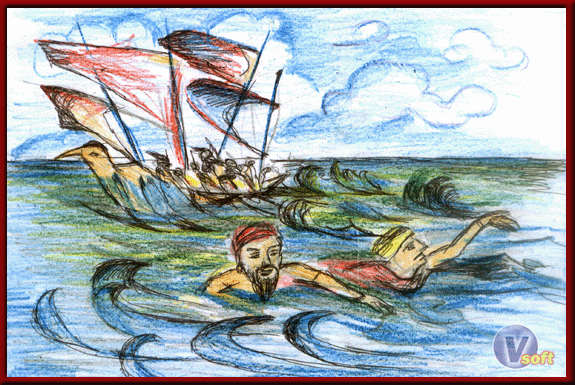283. The Bodhisatta As Sailor

Once upon a time, this Benares was named Molini. While Brahmadatta reigned in Molini as king, a brahmin Sankha, rich, of great wealth, had built alms-halls in six places, one at each of the four city gates, one in the midst of it, one by his own door. Daily he gave in alms six hundred thousand pieces of money, and to wayfarers and beggars he did much bounty.
One day he thought to himself, “My store of wealth once gone, I shall have nothing to give. While it is still unexhausted I will take ship, sail for the Gold Country, and I will bring back wealth.” So he built a ship, filled it with merchandise. He said to wife and child, “Until my arrival do not stop alms-giving.”
At that moment, a Pacceka Buddha on Mount Gandha-madana, meditating, saw him on his way to get wealth, passing through the air, he met him. Sankha greeted him and after showing his hospitality he gave his shoes and sunshade to the monk. Pacceka Buddha flew up and went on his way again to Gandha-madana.
The Bodhisatta on his part, glad at heart, proceeded to the harbour, and took ship.
When they were come to the high seas, on the seventh day the ship sprang a leak, and they could not bale the water clear. All the people in fear for their lives made a great outcry, calling each upon his own god. The Great Being chose him one servitor, and anointing all his body with oil, ate a mess of powdered sugar with ghee as much as he desired, and giving the man to eat also, he climbed up the mast. He said, “Our city lies in that direction.” Pointing out the direction, and casting off all fear, he dived off the ship. All except one with Sankha perished; but the Great Being, with his servant, began to make his way over the sea. For seven days he kept on swimming. Even then he kept the holy fast day, washing his mouth with the salt water.
Now at that time a divinity named Manimekhala had been commanded by the four lords of the world. If by shipwreck any person endued with virtue, or who worship their parents the deity would save them. That deity on the seventh day, scanning the sea, saw the virtuous brahmin Sankha. She filled a golden plate full of divine meats flew near him and stood in the air. She said, “You have not taken any food for the past seven days. Eat this!” The brahmin looked at her, and replied, “Take your food away, for I am keeping fast.”
His attendant, who came behind did not see the deity but heard only the sound; and said, “What is the use of babling? When there is nobody, to whom you are talking to?”
The brahmin understood that he had not seen the deity and he said, “It is a fair radiant presence, that offers me food and to her I am answering no.”
Then the servant said, “If you see such a person, ask her whether she is human or deity and ask for blessings.
The brahmin asked, “Are you a goddess, or woman? For that the deity replied:
“I am the mighty goddess of ocean and I came to save you. Here is food and drink. You, Sankha, I will make you lord of every thing.”
On hearing this the Great Being thought it over. “Why is this deity, in the middle of the ocean, offering me this thing and that thing. Why does she wish to offer them to me?” Then he asked the deity, “Is it for any virtuous act of mine?”
The deity listened to him thinking, “This brahmin has put his question, I suppose, because he imagines I know not what good deed he has done; I will just tell him. “So she told him about the gift of shoes and sunshade to Pacceka Buddha.
When the Great Being heard this, he thought to himself: What in this impracticable ocean the gift of shoes given by me has become a giveall to me. Ah, lucky was my gift to the pacceka Buddha!” Then, in great contentment, he said to the deity: “The ship is broken; so take me to Molini immediately.”
The deity made a ship with three masts made of sapphire cordage, silver sails, and with golden oars and the rudders. The deity filled the ship with the seven precious things; then took the brahmin and the servant and put them on the ship. Then she guided the ship to the city of Molini and having stored all this wealth in the brahmin’s house returned to her place of dwelling.
And the brahmin all his life long dwelt at home, distributing bounty without end observing virtue; and at the end went to swell the host of heaven.


Leave a Reply